|
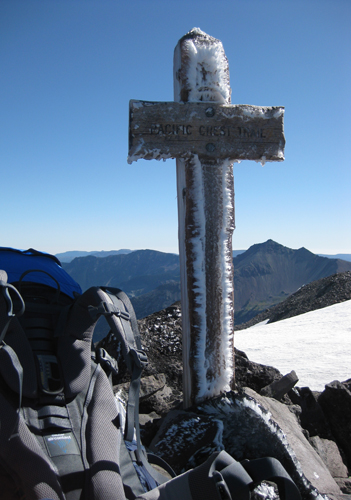 It
didn't take me long after completing the first section of the PCT
to start planning for the next. Since summers are now being spent
cruising our sailboat in Alaska, spring and fall are the only time
I have available for hiking. This limits the trail sections available.
As a Section Hiker, I can pick and choose the area to hike based
on the best season and whether it's best to hike north to south
or vice versa. Southern California is best in the spring, when water
is more available and the weather cooler. Fall can be great in most
areas, though weather is not as dependable. It
didn't take me long after completing the first section of the PCT
to start planning for the next. Since summers are now being spent
cruising our sailboat in Alaska, spring and fall are the only time
I have available for hiking. This limits the trail sections available.
As a Section Hiker, I can pick and choose the area to hike based
on the best season and whether it's best to hike north to south
or vice versa. Southern California is best in the spring, when water
is more available and the weather cooler. Fall can be great in most
areas, though weather is not as dependable.
Perhaps a little over confident after the success
of my spring hike, I decided to take a chance and planned an early
fall hike in Southern Washington. I would follow this by another
section in Southern California. Helping to fuel all my planning
was a high school reunion in Las Vegas, scheduled for the third
weekend in September. I developed a plan to hike from White Pass
to the Columbia River (148 miles) from September 8 - 19, fly to
Las Vegas for the reunion, then hike from Cajon Pass to Hwy 10 (134
miles) from September 21 - October 3rd. And if all was going well,
take the Tram back up to Mt. Jacinto and finish the 30 miles I was
unable to complete in the spring.
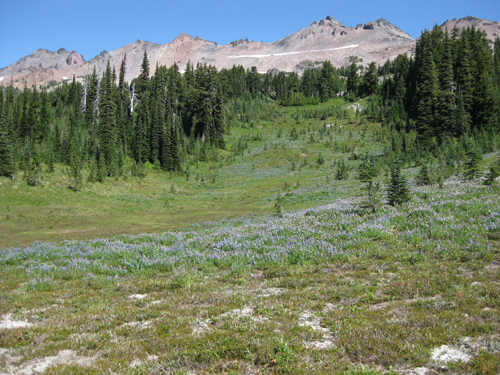 In
addition to getting provisions together, packed and mailed for pickup
along the trail at strategic points, there was the logistics of
getting to and from trail heads. There is no public transportation
to White Pass, so someone was going to have to drive me, 215 miles
from Port Townsend. It was going to take someone special to help
me out. I had gotten to know Peggy who was part of a group of women
I hike with every month, and I thought, "what the heck?"
I'll just ask. And she said yes! I told her that I'd love her to
join me for a day or two on the trail if she was game. I enlisted
my friend Dave, who lives in White Salmon, 30 miles south of the
PCT to resupply me on day 6. And my friend Chuck, who lives on the
Columbia River, agreed to pick me up at the Cascade Locks on the
Columbia River. I could get some kind of transportation into Portland
for my flight to Las Vegas. So that took care of that section. In
addition to getting provisions together, packed and mailed for pickup
along the trail at strategic points, there was the logistics of
getting to and from trail heads. There is no public transportation
to White Pass, so someone was going to have to drive me, 215 miles
from Port Townsend. It was going to take someone special to help
me out. I had gotten to know Peggy who was part of a group of women
I hike with every month, and I thought, "what the heck?"
I'll just ask. And she said yes! I told her that I'd love her to
join me for a day or two on the trail if she was game. I enlisted
my friend Dave, who lives in White Salmon, 30 miles south of the
PCT to resupply me on day 6. And my friend Chuck, who lives on the
Columbia River, agreed to pick me up at the Cascade Locks on the
Columbia River. I could get some kind of transportation into Portland
for my flight to Las Vegas. So that took care of that section.
Getting to Cajon Pass for the section after Las
Vegas was my next challenge. I could get transportation from Las
Vegas to Victorville, 20 miles north of Cajon Pass, but no public
transport is available to the Pass. I put out a request on the PCT
Forum page for a ride to the Pass and actually got 3 responses from
"Trail Angels". That was easier than I expected. At the
other end, another Trail Angel agreed to give me a ride from Cabazon
on Hwy 10 to the Tram. I would fly back to Seattle from Palm Springs.
Now all I had to do was hike.
Normally I wouldn't depart Cordova, AK, home-port
for Tamara, until the first of October, but due to necessary boat
yard work, we had not planned on an ambitious cruise this summer.
I arranged to fly back to Seattle on Labor Day. That would give
me 4 days to get ready for the hike. The weather forecast was looking
good except for the third day on the trail where wind and rain were
forecast.
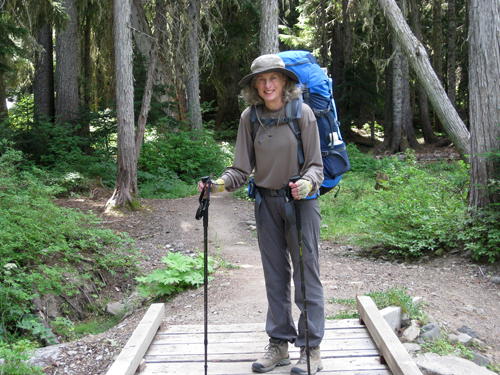 Peggy
picked me up at 7:30 am on Saturday, Sept 8th and we were at White
Pass by noon. I was glad that Peggy had decided to hike with me
to my first camp, spend the night and return the next day. I had
decided to hike only 5 miles the first day, putting us directly
over the White Pass Ski area. Since I was hiking north to south,
and the majority of Thru Hikers were transiting Washington state
northbound at that time, I decided to keep track of the number of
Thru Hikers I encountered each day. Peggy
picked me up at 7:30 am on Saturday, Sept 8th and we were at White
Pass by noon. I was glad that Peggy had decided to hike with me
to my first camp, spend the night and return the next day. I had
decided to hike only 5 miles the first day, putting us directly
over the White Pass Ski area. Since I was hiking north to south,
and the majority of Thru Hikers were transiting Washington state
northbound at that time, I decided to keep track of the number of
Thru Hikers I encountered each day.
I had been following the trail journals online
of hikers I had met in the spring, focusing on the section I would
be hiking to learn of any areas I should pay particular attention.
One area kept coming up - a 3 mile section of the trail 17 miles
south of White Pass. The trail traversed the spine of a ridge, was
very steep and in some places less then a few feet wide. As I began
meeting hikers who had just hiked that particular section I began
to hear stories of how "scary" it was - 1,000 vertical
feet in less than half a mile on very lose rock. I realized that
if the weather forecast held I would be doing that section in bad
weather.Before the first day was over I was thinking that I might
have to take a day off on day three.
Peggy was planning on just "cowboy camping"
that night, that is to say sleeping in her bag on a space blanket
and her pad, under the open sky. But when she opened up the space
blanket it totally disintegrated! Luckily there was plenty of room
under my fly sheet. The mosquitoes were out that evening and we
sat wrapped in clothes with bug juice on our hands and faces playing
cards. Just before sunset we could hear an incredible thunder and
lightning storm to the south, moving east. (The next day, when I
asked two women who had camped at 7,500 ft. how it was, they remarked
"interesting".) By the time we got into our bags the mosquitoes
were gone. There were rain showers off and on most of the night,
and I knew Peggy was glad to be under my fly sheet.
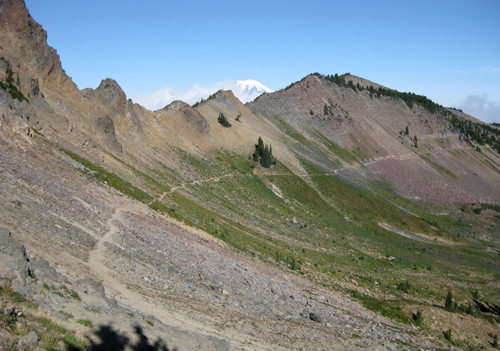 Peggy
and I said our farewells in the morning - THANK YOU Peggy for the
ride and companionship! - and I was off on
my own. A hike of 10 miles put me in position to do the difficult
section the next day, weather permitting. Going against the flow
of Thru Hikers made it easy to keep a record of Thru Hikers vs.
Section and short hikers. I also found it interesting to also note
when the Thru Hikers had left Campo, on the Mexican border, and
how many miles they were hiking per day. Since these hikers had
just hiked the difficult section, I'd ask how it went. The best
advice I got was from a guy who sounded like he was from New Zealand,
who noted that since I'd be hiking UP the steep ridge it would be
much easier than hiking down. I made camp the second night in a
nice clearing. About 10:00 pm, in the dark, 2 people came in and
camped. I kept wondering how they had been able to hike a very difficult
section in the dark! And it was now very windy and rainy. Peggy
and I said our farewells in the morning - THANK YOU Peggy for the
ride and companionship! - and I was off on
my own. A hike of 10 miles put me in position to do the difficult
section the next day, weather permitting. Going against the flow
of Thru Hikers made it easy to keep a record of Thru Hikers vs.
Section and short hikers. I also found it interesting to also note
when the Thru Hikers had left Campo, on the Mexican border, and
how many miles they were hiking per day. Since these hikers had
just hiked the difficult section, I'd ask how it went. The best
advice I got was from a guy who sounded like he was from New Zealand,
who noted that since I'd be hiking UP the steep ridge it would be
much easier than hiking down. I made camp the second night in a
nice clearing. About 10:00 pm, in the dark, 2 people came in and
camped. I kept wondering how they had been able to hike a very difficult
section in the dark! And it was now very windy and rainy.
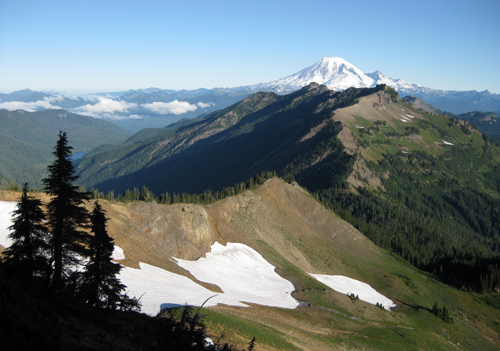 I
was in no hurry to leave in the morning, since it was still very
windy and the visibility poor due to low clouds. At 11:00 am I decieded
to continue hiking, and stop if conditions were bad. I got about
a mile and ran into a man about my age. He said that the conditions
ahead were difficult, he'd gotten blown over a few times, but with
some caution the trail was passable. Right behind him was a couple
from the Czech Republic who did not recommend proceeding until the
wind laid down. He said that he'd done a lot of mountaineering and
had never feared for his life until then! That settled it - I would
make camp just up the trail and wait until the next day. My camp
was in view of the trail, and for the rest of the the day I talked
with most of the hikers who passed. It was unanimous - after more
than 2,000 miles this was the worst section yet. One girl said she
thought she was going to die three times! I did ask a young women
if she'd call my friend Dave when she got to White Pass and let
him know our rendevous to resupply would be delayed a day. I
was in no hurry to leave in the morning, since it was still very
windy and the visibility poor due to low clouds. At 11:00 am I decieded
to continue hiking, and stop if conditions were bad. I got about
a mile and ran into a man about my age. He said that the conditions
ahead were difficult, he'd gotten blown over a few times, but with
some caution the trail was passable. Right behind him was a couple
from the Czech Republic who did not recommend proceeding until the
wind laid down. He said that he'd done a lot of mountaineering and
had never feared for his life until then! That settled it - I would
make camp just up the trail and wait until the next day. My camp
was in view of the trail, and for the rest of the the day I talked
with most of the hikers who passed. It was unanimous - after more
than 2,000 miles this was the worst section yet. One girl said she
thought she was going to die three times! I did ask a young women
if she'd call my friend Dave when she got to White Pass and let
him know our rendevous to resupply would be delayed a day.
About 2:00 pm I decided to hike further up the
trail just to check it out. I ran into a women from Newfoundland
who, when asked about the trail said, "I'm from Newfoundland
and love the wind and fog! On the exposed ridges where the wind
was the strongest I'd just hunker down, wait for a break and then
go." She definitely had the right attitude.
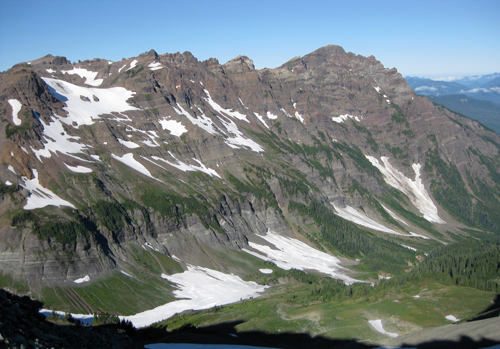 I
woke up the next morning at 5:30 am to complete silence, a clear
sky, and was on the trail at 7:00 am.
After all the stories about this next section of the trail my plan
was to go slow and place each foot carefully. I
woke up the next morning at 5:30 am to complete silence, a clear
sky, and was on the trail at 7:00 am.
After all the stories about this next section of the trail my plan
was to go slow and place each foot carefully.
The summit was reached at 11:30 am without encountering
anyone heading north. I was glad that I was climbing instead of
descending the last half mile. What a beautiful day! The views were
incredible - so glad I waited. After all the build up and horror
stories about the section I just hiked, I hadn't found it that difficult.
At the summit, I met a man from Portland, OR climbing
up from the south who was out for 4 days of hiking. He asked if
I was gong to climb Old Snowy, a side trip from the trail summit.
Maybe another time. A mile further was Snow Grass Flats, a popular
area for hiking, and one worth visiting again. The rest of the day's
hike was spent taking in the views of the Goat Rocks, the abundant
wildflowers, and Mt. Adams to the south.
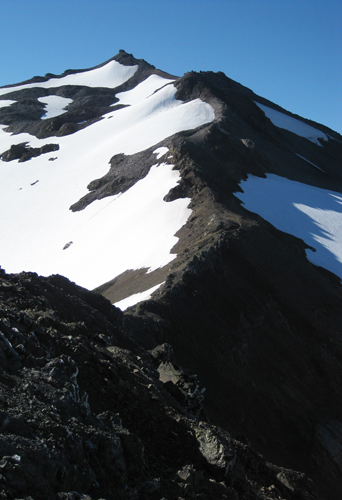 I
was encountering 10 - 15 Thru Hikers a day, all intent on making
30 miles a day, and reaching the Canadian Border before the bad
weather settled in. The forecast was sunny and warm for the next
week. I was happy to put in 15 miles a day and not feel pressure
to do more. I
was encountering 10 - 15 Thru Hikers a day, all intent on making
30 miles a day, and reaching the Canadian Border before the bad
weather settled in. The forecast was sunny and warm for the next
week. I was happy to put in 15 miles a day and not feel pressure
to do more.
On Day 6 I learned of the fires on the south flank
of Mt. Adams. The day before I had noticed a red haze around the
sun late in the afternoon, but stupidly I wasn't thinking about
fires. Peggy and I had talked about a strategy if I encountered
a fire, this still being fire season. The trail was open but I learned
from hikers coming from the south that there was heavy smoke and
ash at lower elevations. Mid-day I stopped for lunch at a beautiful
meadow directly under Mt. Adams to the east. Within a short period
of time a plume of reddish smoke appeared on the south flank, moving
north. I decided it would be best to keep moving and as I was packing
up three women came along on horseback. They were camped on a forest
road about 5 miles off the trail. It was reassuring to know that
if the winds changed, and I needed to make a quick get away, I could
get to the road and have a way out. That evening I could see Mt.
Adams from my camp and the smoke had cleared off.
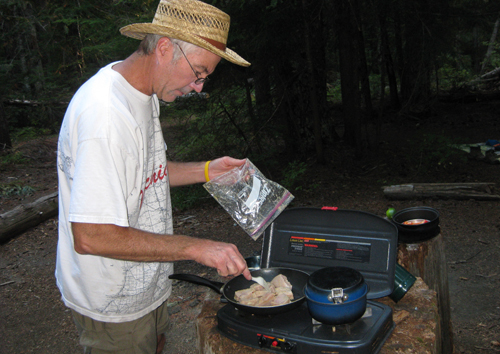 Day
7, Friday, was the day I was to rendezvous with our friend Dave
for resupplies. I arrived at 11:30 am after 10 miles of mostly downhill,
not knowing if Dave got the message of my delay. I was soaking my
feet and washing socks when Dave showed up. I had not encountered
any smoke as I hiked down to the lower elevation, but Dave said
that on the road up from White Salmon he had passed through lots
of smoke. Dave had been fishing the week before and had fresh albacore,
couscous, and wine that he would prepare for me for dinner. It was
another 5 miles to that evening's camp and Dave agreed to meet me
at my camp, one mile off the road. What a treat! As Dave prepared
dinner I dealt with my resupplies. Thank you Dave! Day
7, Friday, was the day I was to rendezvous with our friend Dave
for resupplies. I arrived at 11:30 am after 10 miles of mostly downhill,
not knowing if Dave got the message of my delay. I was soaking my
feet and washing socks when Dave showed up. I had not encountered
any smoke as I hiked down to the lower elevation, but Dave said
that on the road up from White Salmon he had passed through lots
of smoke. Dave had been fishing the week before and had fresh albacore,
couscous, and wine that he would prepare for me for dinner. It was
another 5 miles to that evening's camp and Dave agreed to meet me
at my camp, one mile off the road. What a treat! As Dave prepared
dinner I dealt with my resupplies. Thank you Dave!
I was now half way, out of the high country and
more or less back in civilization. The trail would cross at least
one road everyday, and with the weekend starting, there were numerous
people about. Also, being bow season, hunters were around. Since
I had lost a day I had to finish on the 19th in order to catch a
flight that evening to Las Vegas. The weather forecast was for sunny
skies, I was doing 15 miles a day, so could meet my deadline as
long as I didn't have any physical problems.
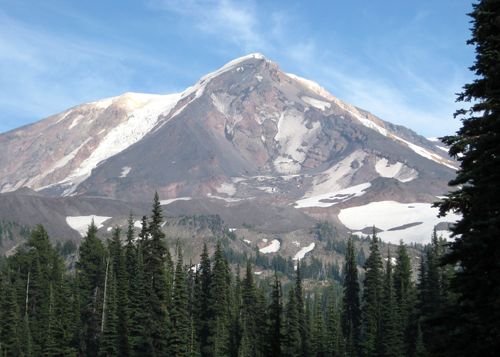 I
was now hiking mostly in forest and on rare occasions I would get
a glimpse of Mt. Adams. The fires were still burning, and as the
days went by Mt. Adams became more and more obscured by smoke until
finally it totally disappeared. I
was now hiking mostly in forest and on rare occasions I would get
a glimpse of Mt. Adams. The fires were still burning, and as the
days went by Mt. Adams became more and more obscured by smoke until
finally it totally disappeared.
On Day 10 I hiked 19 miles!
But I paid for it the next day. My knees were beginning to protest
against the downhill sections, and my feet were hurting in new places
. But I took a couple of aspirin every night and in the morning
I was ready to go. The last three days were up-hill all morning,
down all afternoon. On the last full day there was a 3,000 ft. descent,
the trail was very rocky and my knees were very sore - I just wanted
to get into camp. And then, 2 miles from camp, I missed the PCT
turnoff (an unmarked side trail) and ended up on a dirt road miles
off course. A car just happened to be turning around and I asked
"Is this the PCT?" No, but the driver offered to take
me to the trail, just above my evening camp. I was now 4 miles from
the Cascade Locks, an easy morning hike the next day.
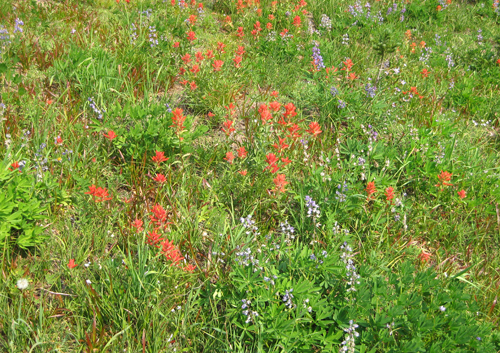 Day
13 I crossed the Cascade Locks Bridge into Oregon at 9:30 am, and
the end of this section of the PCT. Had I arrived the day before
as planned, another friend Chuck was going to pick me up, I'd stay
over at his house, and then get into Portland the next day. He also
would have my provisions, which I sent to Dave, for the next PCT
section in Southern California. Now Chuck would just deliver the
provisions and another friend, Anna, would take me to Portland,
where she lives. While I waited for Chuck and Anna to arrive, I
had a big breakfast at the local cafe. They both arrived about noon,
so we went to another cafe where I bought lunch for everyone. Day
13 I crossed the Cascade Locks Bridge into Oregon at 9:30 am, and
the end of this section of the PCT. Had I arrived the day before
as planned, another friend Chuck was going to pick me up, I'd stay
over at his house, and then get into Portland the next day. He also
would have my provisions, which I sent to Dave, for the next PCT
section in Southern California. Now Chuck would just deliver the
provisions and another friend, Anna, would take me to Portland,
where she lives. While I waited for Chuck and Anna to arrive, I
had a big breakfast at the local cafe. They both arrived about noon,
so we went to another cafe where I bought lunch for everyone.
Anna and I proceeded to Portland, where I got
a long hot shower and washed my clothes. I know Anna from the American
School in Japan - she was a year behind me when we were both high
school students abroad. Then Anna made a great dinner and got me
to the airport for my Las Vegas flight. Thank you Anna!
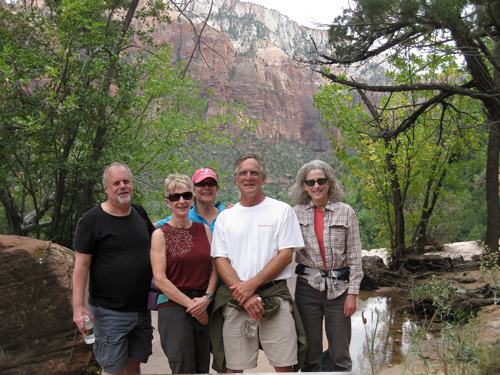 Not
to bore you any more, and to make a long story short, once I arrived
in Las Vegas I decided not to do the next section of trail in Southern
California. It was going to be too hot, water sources unpredictable,
and though I hike alone, it's nice to know there are other people
on the trail. At that time of year, the trail would be empty. With
my knees needing some time off, I made the decision to do that section
of trail next spring. Instead, after the reunion, I joined a small
group who were going to St. George, Utah and Zion National Park
for a couple of days. I hadn't been there since 1985! I then flew
from Las Vegas to Portland, and spent a few more days with Anna
before returning to Port Townsend. Not
to bore you any more, and to make a long story short, once I arrived
in Las Vegas I decided not to do the next section of trail in Southern
California. It was going to be too hot, water sources unpredictable,
and though I hike alone, it's nice to know there are other people
on the trail. At that time of year, the trail would be empty. With
my knees needing some time off, I made the decision to do that section
of trail next spring. Instead, after the reunion, I joined a small
group who were going to St. George, Utah and Zion National Park
for a couple of days. I hadn't been there since 1985! I then flew
from Las Vegas to Portland, and spent a few more days with Anna
before returning to Port Townsend.
A few statistics:
While on the trail I met: 2 Czechs, 3 Kiwis, 2
Brits, 2 Dutch, 2 Japanese and 1 Newfie
10 - 15 Thru Hikers per day, each averaging 25
- 30 miles per day
|











 Not
to bore you any more, and to make a long story short, once I arrived
in Las Vegas I decided not to do the next section of trail in Southern
California. It was going to be too hot, water sources unpredictable,
and though I hike alone, it's nice to know there are other people
on the trail. At that time of year, the trail would be empty. With
my knees needing some time off, I made the decision to do that section
of trail next spring. Instead, after the reunion, I joined a small
group who were going to St. George, Utah and Zion National Park
for a couple of days. I hadn't been there since 1985! I then flew
from Las Vegas to Portland, and spent a few more days with Anna
before returning to Port Townsend.
Not
to bore you any more, and to make a long story short, once I arrived
in Las Vegas I decided not to do the next section of trail in Southern
California. It was going to be too hot, water sources unpredictable,
and though I hike alone, it's nice to know there are other people
on the trail. At that time of year, the trail would be empty. With
my knees needing some time off, I made the decision to do that section
of trail next spring. Instead, after the reunion, I joined a small
group who were going to St. George, Utah and Zion National Park
for a couple of days. I hadn't been there since 1985! I then flew
from Las Vegas to Portland, and spent a few more days with Anna
before returning to Port Townsend.